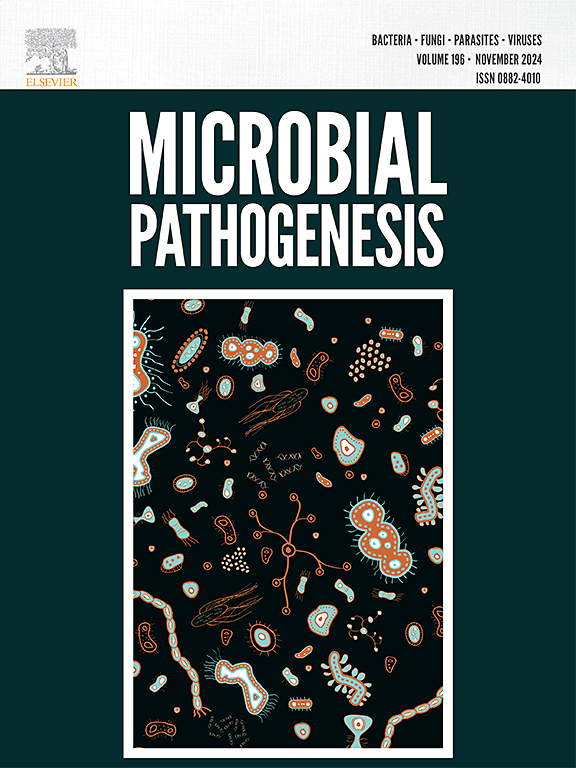ACE2 mitigates PEDV-induced endoplasmic reticulum stress and autophagy by inhibiting ROS production
IF 3.5
3区 医学
Q3 IMMUNOLOGY
引用次数: 0
Abstract
Role of ACE2 in regulating inflammatory damage has been recognized, its association with ER stress and autophagy under PEDV infection remains elusive. To clarify the above associations, this study first established a stress injury model through PEDV infection to determine whether it can induce ER stress or autophagy. Then, the relationships between ER stress, autophagy and ROS under PEDV infection were verified. Finally, the immune regulatory role and molecular mechanism of ACE2 in PEDV induced ER stress and autophagy were explored by regulating the expression of ACE2. The results showed that PEDV elicited ER stress and activates the UPR response. Autophagy was triggered by PEDV to facilitate its replication with the involvement of ER stress as a mediator. ER stress and autophagy were both consequences of PEDV replication within cells. PEDV caused accumulation of ROS. ROS plays a pivotal role as an upstream regulatory factor in ER stress and autophagy. However, ACE2 plays a pivotal regulatory role in the aforementioned cellular processes. ACE2 inhibited ER stress and autophagy by reducing intracellular ROS production. These results reveal that PEDV infection can induce ER stress and mediate the occurrence of autophagy, and this process is regulated by the upstream factor ROS. Overexpression of ACE2 inhibits ER stress and autophagy by reducing the production of intracellular ROS, thereby restoring the REDOX homeostasis of host cells, and mitigating cell damage caused by PEDV. The research results provide new ideas and theoretical basis for ACE2 in intestinal inflammatory injury induced by PEDV infection.
ACE2通过抑制ROS的产生减轻pedv诱导的内质网应激和自噬
ACE2在调节炎症损伤中的作用已被确认,但其与PEDV感染下内质网应激和自噬的关系尚不清楚。为了阐明上述关联,本研究首先通过PEDV感染建立应激损伤模型,确定其是否能诱导内质网应激或自噬。验证PEDV感染下内质网应激、自噬和ROS之间的关系。最后,通过调节ACE2的表达,探讨ACE2在PEDV诱导的内质网应激和自噬中的免疫调节作用及分子机制。结果表明,PEDV诱导内质网应激,激活UPR反应。自噬是由PEDV触发的,以促进其复制,内质网应激作为中介参与。内质网应激和自噬都是PEDV在细胞内复制的结果。PEDV引起ROS的积累。ROS在内质网应激和自噬过程中作为上游调控因子发挥着关键作用。然而,ACE2在上述细胞过程中起着关键的调节作用。ACE2通过减少细胞内ROS的产生抑制内质网应激和自噬。这些结果表明,PEDV感染可诱导内质网应激并介导自噬的发生,该过程受上游因子ROS的调控。ACE2过表达通过减少细胞内ROS的产生抑制内质网应激和自噬,从而恢复宿主细胞氧化还原稳态,减轻PEDV引起的细胞损伤。研究结果为ACE2在PEDV感染引起的肠道炎症损伤中的作用提供了新的思路和理论依据。
本文章由计算机程序翻译,如有差异,请以英文原文为准。
求助全文
约1分钟内获得全文
求助全文
来源期刊

Microbial pathogenesis
医学-免疫学
CiteScore
7.40
自引率
2.60%
发文量
472
审稿时长
56 days
期刊介绍:
Microbial Pathogenesis publishes original contributions and reviews about the molecular and cellular mechanisms of infectious diseases. It covers microbiology, host-pathogen interaction and immunology related to infectious agents, including bacteria, fungi, viruses and protozoa. It also accepts papers in the field of clinical microbiology, with the exception of case reports.
Research Areas Include:
-Pathogenesis
-Virulence factors
-Host susceptibility or resistance
-Immune mechanisms
-Identification, cloning and sequencing of relevant genes
-Genetic studies
-Viruses, prokaryotic organisms and protozoa
-Microbiota
-Systems biology related to infectious diseases
-Targets for vaccine design (pre-clinical studies)
 求助内容:
求助内容: 应助结果提醒方式:
应助结果提醒方式:


